|
|
|
Sort Order |
|
|
|
Items / Page
|
|
|
|
|
|
|
| Srl | Item |
| 1 |
ID:
108517


|
|
|
|
|
| Publication |
2011.
|
| Summary/Abstract |
The article posits that in global politics, and in the scholarly subfield of international ethics, we should begin moving away from intentions and intentionality when considering accountability. Intentionality is problematic in at least three respects - analytically it is hard to determine; normatively it is difficult because we must invest our trust in authority; and it comes coupled with the problematic relationship between means and ends. This article explores these issues through three sections. First, it engages some of the purposes but also overall problems with 'intentions' in world politics (and especially the debate as it has progressed in the field of international ethics). The second section reviews recent theses on accountability, before moving towards an alternative aspect of accountability which already exists in world politics, termed in this article 'the accountability of the scar'. This last form of accountability refers to the physical damage produced by violence, with reference to three domains - the anthrobiological, the architectural, and the agentic sphere. Two examples of the scar come to us from the different context of the Emmett Till case of 1955 and the more fluid, and recent case of Iranian protestor Neda Agha-Soltan.
|
|
|
|
|
|
|
|
|
|
|
|
|
|
|
|
| 2 |
ID:
108514
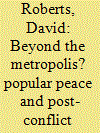

|
|
|
|
|
| Publication |
2011.
|
| Summary/Abstract |
The debate on peacebuilding is deadlocked. Leading scholars of 'fourth generation' peacebuilding, who take Liberalism to task for creating what they refer to as crises in peacebuilding, have themselves been challenged by those they criticise for over-stating Liberal failure and failing themselves to produce the goods in terms of an alternative. But behind this debate, it seems that both approaches are asking the same question: how can stable, legitimate, sustainable peace be engineered? This article engages critical theory with problem-solving social sciences. It proposes that the crises in orthodox post-conflict peacebuilding are genuine, but there are approaches that might put flesh on fourth generation concepts without bringing the Liberal edifice down, shifting the debate away from ontology and ideology and returning it to the people in whose name it is held.
|
|
|
|
|
|
|
|
|
|
|
|
|
|
|
|
| 3 |
ID:
108508
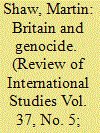

|
|
|
|
|
| Publication |
2011.
|
| Summary/Abstract |
This article (originally given as the Annual War Studies Lecture at King's College, London, on 25 January 2010) challenges the assumption that Britain's relationship to genocide is constituted by its 'vigilance' towards the genocide of others. Through a critical overview of the question of genocide in the historical and contemporary politics of the British state and society, the article suggests their wide-ranging, complex relationships to genocide. Utilising a conception of genocide as multi-method social destruction and applying the interpretative frames of the genocide literature, it argues that the British state and elements of identifiably British populations have been involved directly and indirectly in genocide in a number of different international contexts. These are addressed through five themes: the role of genocide in the origins of the British state; the problem of genocide in the Empire and British settler colonialism; Britain's relationships to twentieth-century European genocide; its role in the genocidal violence of decolonisation; and finally, Britain's role in the genocidal crises of the post-Cold War world. The article examines the questions of national responsibility that this survey raises: while rejecting simple ideas of national responsibility as collective guilt, it nevertheless argues that varying kinds of responsibility for genocide attach to British institutions, leaders and population groups at different points in the history surveyed.
|
|
|
|
|
|
|
|
|
|
|
|
|
|
|
|
| 4 |
ID:
108496
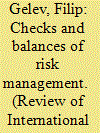

|
|
|
|
|
| Publication |
2011.
|
| Summary/Abstract |
After the terrorist attacks of 11 September 2001 Ulrich Beck placed terrorism alongside other potentially catastrophic events such as global warming, nuclear disaster, and influenza as one of the 'dimensions' of risk society. In risk society, executive governments take 'precautionary measures' and parliaments pass 'preventative laws' allowing them to accumulate information, detain terrorism suspects, freeze funds and prohibit various groups, in order to stop catastrophic risks from eventuating. International Relations and legal scholars have used risk society theory or the ideas of Michel Foucault to criticise such excesses of the executive and parliamentary branches of government. Most studies either ignore the judiciary or argue that it stands in opposition to the other branches of governments, that it imposes checks and balances in order to uphold the rule of law and protect individual rights. The article argues that this view is naïve and does not acknowledge a long history of judicial deference to the will of the executive and parliament. Through an analysis of case law from Australia and Canada the article explores parallels between early 21st century judicial reasoning and previous periods of crisis, including the Cold War, while identifying some new 'precautionary approach' aspects. The judiciary defers to the executive, asserts that the executive is more accountable than it, and seeks to avoid responsibility for engaging in this 'precautionary justice'. Furthermore, seized by the same fear of terrorism as executive governments, the judiciary shows an ability to adapt existing legal concepts to the exigencies of risk society. The article concludes that as the memory of the 9/11 attacks fades some of the most draconian preventative measures may be scaled back but the judiciary cannot be relied on to keep the executive or parliament in check.
|
|
|
|
|
|
|
|
|
|
|
|
|
|
|
|
| 5 |
ID:
108507
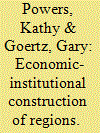

|
|
|
|
|
| Publication |
2011.
|
| Summary/Abstract |
The international relations literature on regionalism, both in economic and security issues, has grown dramatically over the last 15 years. One of the ongoing issues discussed in most articles and books is the conceptualisation of 'region'. Instead of thinking about regions using notions of interdependence and interaction we take a social constructivist approach, whereby states themselves define regions via the construction of regional economic institutions (REI). We explore how a conceptualisation of region based on REIs contrasts with various related concepts such as regional system, and regional IGO. Empirically, we show that most all countries belong to at least one important regional economic institution, REI, (for example, EU, Mercosur, ASEAN, etc). In short, the world is dividing itself into regions by the creation of regional economic institutions. We contrast our economic-institutional approach to regions with Buzan and Wæver's 'regional security complexes' which is based on security dependence. There are interesting agreements and disagreements between their approach and our economic-institutional approach to defining regions. It is perhaps not surprising that many REIs have taken on security roles, which we briefly show by looking at military alliances embedded in REIs. This suggests that policymakers are creating regions through institutional innovations that link economic and security issues.
|
|
|
|
|
|
|
|
|
|
|
|
|
|
|
|
| 6 |
ID:
108516


|
|
|
|
|
| Publication |
2011.
|
| Summary/Abstract |
This article examines the idea of equality in the theory of international society. Contrary to the widespread contemporary notion of equality as a corollary principle to sovereignty, the central argument of the article is that equality and sovereignty can and ought to be disconnected, and that the concept of equality, when uncoupled from sovereignty, is a better point of departure when theorising international society than is, for example, non-intervention or sovereignty. An alternative approach to deal with equality of states and other entities within international society is sketched out.
|
|
|
|
|
|
|
|
|
|
|
|
|
|
|
|
| 7 |
ID:
108483


|
|
|
|
|
| Publication |
2011.
|
| Summary/Abstract |
The article examines the argument that international law is already beginning to reflect cosmopolitanism. It does so by briefly reviewing the history of the ways in which concepts of justice have been represented in international law and then considering the case that cosmopolitanism is present in various forms in contemporary international law. While dismissing some of the stronger cosmopolitan claims it argues that the fuller picture has complexities that International Relations Realists and legal Positivists tend to ignore.
|
|
|
|
|
|
|
|
|
|
|
|
|
|
|
|
| 8 |
ID:
108505
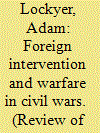

|
|
|
|
|
| Publication |
2011.
|
| Summary/Abstract |
This article explains how foreign assistance to one or both sides in a civil war influences the dynamics of the conflict. It submits that external assistance has the potential of affecting the military capabilities available to the belligerents. It then argues that the balance of those capabilities impacts significantly on whether the warfare in a civil war assumes a conventional, guerrilla or irregular form. These theoretical assertions are tested against the case of the Angolan Civil War. It is shown that during that war, variations in the form of warfare correlated closely to the type, degree, and direction of foreign intervention given to each of the belligerents.
|
|
|
|
|
|
|
|
|
|
|
|
|
|
|
|
| 9 |
ID:
108510
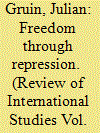

|
|
|
|
|
| Publication |
2011.
|
| Summary/Abstract |
A central concern of critical theory is that of how the forces of Modern reason cause certain logics to become reified in the name of rational progress. Two such logics - the ongoing spread of liberal capitalism, and territorial particularism - are simultaneously embodied within social institutions such as the World Trade Organization (WTO) that regulate the global economy, a phenomenon that occurs on the premise of maximising global welfare. Building upon a critical reading of Jürgen Habermas' theory of communicative action, this article undertakes an empirical immanent critique of the extent to which such logics repress the possibility of normative imperatives being considered within agricultural trade negotiations. Specifically, it argues that the dialectic of functionalist and communicative rationality, operating as a theoretical heuristic, reveals that the DDA is susceptible to an ethical indictment that arises from its inability to countenance the alternatives to the dual logics of neo-liberalism and state-interest that could otherwise emerge from a free and rational discussion. The nature of the WTO as a site of social action is revealed to be that of a closed epistemic community in which important normative claims are repressed, and as such, one in which the underlying rational bases for communication are fundamentally distorted.
|
|
|
|
|
|
|
|
|
|
|
|
|
|
|
|
| 10 |
ID:
108509


|
|
|
|
|
| Publication |
2011.
|
| Summary/Abstract |
At the December 1998 Saint-Malo summit, Britain and France promised to set aside past rivalries and work together on African issues. While brief indications were given as to possible areas of bilateral and 'bi-multi' cooperation, the terms and scope of this 'partnership' were not spelt out. Was this to involve only sporadic collaboration? Or was it to be an institutionalised partnership, such as the Franco-German tandem, or perhaps a more intuitive alliance, such as the Anglo-American 'special relationship'? These questions are central to this article, which begins by showing how Anglo-French relations in Africa were largely marked by rivalry from the colonial era to the early post-Cold War period. Drawing upon extensive interviews, it demonstrates how, over the last decade or so, closer linkages have developed between the UK and French administrations and how there has been a greater degree of cooperation in response to the key challenges of Africa. It then uses a neo-classical realist framework to explain the readiness or reluctance of Britain and France to collaborate on Africa. It concludes by suggesting that, while there has been progress in 'deconflictualising' African policies, cooperation has been, and is likely to remain, limited.
|
|
|
|
|
|
|
|
|
|
|
|
|
|
|
|
| 11 |
ID:
108506
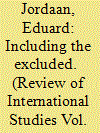

|
|
|
|
|
| Publication |
2011.
|
| Summary/Abstract |
Cosmopolitanism is frequently criticised for overlooking the situatedness of morality and the importance of solidarity in their aspiration to global justice. A number of thinkers take these criticisms seriously and pursue 'a communitarian path to cosmopolitanism'. Four such approaches are considered. All four view morality and justice as grounded in a specific social setting and hold that justice is more likely to result if there is some 'we-feeling' among people, but are simultaneously committed to expanding the realm of justice and moral concern to beyond national boundaries. To enable the theorisation of an expanded realm of situated justice and moral concern, community is conceived as not necessarily corresponding to political boundaries and the moral the self is seen as able and eager to loosen some of its traditional moral connections and to form new ones. Unfortunately, these approaches are likely to exclude significant segments of the world's population from the expanded realm of moral concern they theorise, most notably, a large proportion of the world's poor. It is suggested that the thought of Emmanuel Levinas might offer a way of reducing the gap between solidarity and moral universalism.
|
|
|
|
|
|
|
|
|
|
|
|
|
|
|
|
| 12 |
ID:
108477


|
|
|
|
|
| Publication |
2011.
|
| Summary/Abstract |
There are two central theses to this article, the first is that a special kind of governance authority is needed for principles of distributive social justice ('social justice' from now on) to be applicable to any sphere of human action. The second is that international law does not and cannot represent that kind of governance authority. It is not 'social justice-apt', in my terminology. This is due to the limits inherent in the statist character of international law, a character that underlies the point and purpose of international law in the first place. Putting these together, one can conclude that international law cannot be used to govern the global order according to those principles of social justice that liberal theorists typically defend in the domestic context. This shows that if the cosmopolitan project of extending social justice to the global arena does not find an alternative form of governance for the international order (the problem of 'cosmopolitan coordination') it ceases to be a viable project.
|
|
|
|
|
|
|
|
|
|
|
|
|
|
|
|
| 13 |
ID:
108476
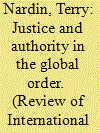

|
|
|
|
|
| Publication |
2011.
|
| Summary/Abstract |
The global justice debate has largely ignored law. But that debate presupposes a legal order within which principles of justice could be implemented. Paying attention to law alters our understanding of global justice by requiring us to distinguish principles that are properly prescribed and enforced within a legal order from those that are not. Given that theories of global governance depreciate law and that cosmopolitan and confederal theories are utopian, the most promising context for a realistic global justice discourse is one that is focused on strengthening, not transcending, the international legal order.
|
|
|
|
|
|
|
|
|
|
|
|
|
|
|
|
| 14 |
ID:
108475
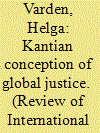

|
|
|
|
|
| Publication |
2011.
|
| Summary/Abstract |
I start this article by addressing Kant's question why rightful interactions require both domestic public authorities (or states) and a global public authority? Of central importance are two issues: first, the identification of problems insoluble without public authorities, and second, why a domestic public monopoly on coercion can be rightfully established and maintained by coercive means while a global public monopoly on coercion cannot be established once and for all. In the second part of the article, I address the nature of the institutional structure of individual states and of the global authority. Crucial here, I argue, is Kant's distinction between private and public right. Private right concerns rightful relations between individual legal subjects, where public right concerns legal subjects' claims on their public institutions. I propose that the distinction between private and public right should be central to liberal critiques of current legal and political developments in the global sphere.
|
|
|
|
|
|
|
|
|
|
|
|
|
|
|
|
| 15 |
ID:
108515


|
|
|
|
|
| Publication |
2011.
|
| Summary/Abstract |
'Legitimacy' is commonly cited as one of three fundamental mechanisms of social control within both domestic politics and international society. However, despite growing attention to the legitimacy of global governance, little consideration has been given to the identity of the political communities that must grant legitimacy to an international organisation or to the conditions under which legitimacy is valuable for the functioning of that organisation. In raising and responding to these questions, this article rejects the argument that actors must gain legitimacy among all subject social constituencies within their political realm of action. Instead, the importance of legitimacy within a particular constituency is a variable. The article labels this variable a 'legitimacy nexus' and outlines five factors that are hypothesised to contribute to calibrating a legitimacy nexus. The plausibility of the proposed schema is explored through discussion of the role of legitimacy in the trade regime and analysis of the origins of the International Labour Organization's anomalous tripartite representative structure.
|
|
|
|
|
|
|
|
|
|
|
|
|
|
|
|
| 16 |
ID:
108486


|
|
|
| 17 |
ID:
108490
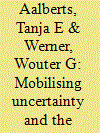

|
|
|
|
|
| Publication |
2011.
|
| Summary/Abstract |
The past few decades have witnessed a fundamental change in the perception of threats to the security of states and individuals. Issues of security are no longer primarily framed in terms of threats posed by an identifiable, conventional enemy. Instead, post-Cold War security policies have emphasised the global and radically uncertain nature of threats such as environmental degradation, terrorism and financial risks. What are the implications of this transformation for one of the constitutive principles of international society: state sovereignty? Existing literature has provided two possible answers to this question. The first focuses on the alleged need for states to seek international cooperation and to relax claims of national sovereignty. In Ulrich Beck's terminology, this would amount to a transformation of sovereign states into 'cosmopolitan states'. The second takes the opposite position: in response to uncertain threats states rely on their sovereign prerogatives to take exceptional measures and set aside provisions of positive law. In Beck's terminology, this would amount to the creation of a 'surveillance state'. None of these two answers, however, does justice to the complex relation between sovereignty, power and (international) law. As this article will show, the invocation of radical uncertainty has led to a transformation in sovereignty that cannot be captured in terms of the cosmopolitan/surveillance dichotomy. What is at stake is a more fundamental transformation of the way in which sovereignty is used to counter threats. Based on a study of the UN Counterterrorism Committee, this article demonstrates how state sovereignty is used as a governmental technology that aims to create proactive, responsible subjects.
|
|
|
|
|
|
|
|
|
|
|
|
|
|
|
|
| 18 |
ID:
108494
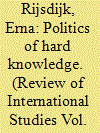

|
|
|
|
|
| Publication |
2011.
|
| Summary/Abstract |
Questions of uncertainty and responsibility have been central to the political and legal investigations of the failed UN/Dutch peacekeeping mission in Srebrenica. The official Dutch NIOD report on the peacekeeping mission has reconstructed the fall of Srebrenica as a surprise attack and as an 'intelligence failure'. The report and its understanding of tactical uncertainty has led to a call for more intelligence in UN operations. I argue that the report builds its claims on a problematic epistemology of intelligence studies drawing upon a politics of 'hard knowledge'. A similar epistemology can be identified in the proceedings of the war crimes tribunal in The Hague (ICTY) in the legal approach of criminal intent for the violence in Srebrenica. Although it is recognised that the political responsibility to prevent genocide and the juridical responsibility to punish those who have committed crimes have different implications for what can be called relevant foreknowledge or criminal intent, both the juridical and the political approaches close off paths for the mobilisation of histories that are more sensitive to the productive workings of language and images and thus to their bearing on possible futures.
|
|
|
|
|
|
|
|
|
|
|
|
|
|
|
|
| 19 |
ID:
108499
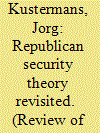

|
|
|
|
|
| Publication |
2011.
|
| Summary/Abstract |
Republicanism is getting increasing attention in International Relations. Engaging Daniel Deudney's Republican Security Theory, it is argued that republicanism should be interpreted in ideological terms, that it is a polysemous tradition of political thought, and that it matters because it is socially embodied in world political practice. Special attention is given to republicanism's relationship to the question of technology. A short case study of the Cold War illustrates the central claims of the argument.
|
|
|
|
|
|
|
|
|
|
|
|
|
|
|
|
| 20 |
ID:
108480
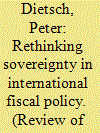

|
|
|
|
|
| Publication |
2011.
|
| Summary/Abstract |
The power to raise taxes is a sine qua non for the functioning of the modern state. Governments frequently defend the independence of their fiscal policy as a matter of sovereignty. This article challenges this defence by demonstrating that it relies on an antiquated conception of sovereignty. Instead of the Westphalian sovereignty centred on non-intervention that has long dominated relations between states, today's fiscal interdependence calls for a conception of sovereignty that assigns duties as well as rights to states. While such a circumscribed conception of sovereignty has emerged in other areas of international law in recent years, it has yet to be extended to fiscal questions. Here, these duties arguably include obligations of transparency, of respect for the fiscal choices of other countries, and of distributive justice. The resulting conception of sovereignty is one that emphasises its instrumental as well as its conditional character. Neither state sovereignty nor self-determination is an end in itself, but a means to promoting individual well-being. It is conditional in the sense that if states do not live up to their fiscal obligations towards other states, their claims to autonomy are void.
|
|
|
|
|
|
|
|
|
|
|
|
|
|
|
|
|
|
|
|
|